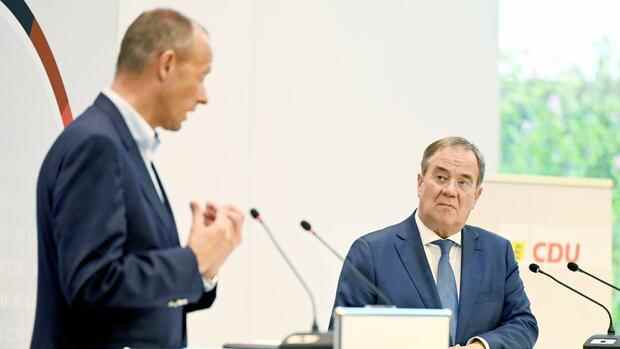Berlin The Union wants to score points in the final phase of the election campaign with a stronger economic and financial profile. Your candidate for Chancellor Armin Laschet and CDU economic expert Friedrich Merz presented an eight-point plan with the central demands and commitments in Stuttgart on Wednesday. “The economic programs of the SPD, the Greens and the Left are very similar in their belief in the state,” he criticized.
The Union, on the other hand, is betting on more freedoms for the economy. He reckons that SPD chancellor candidate Olaf Scholz will definitely enter into an alliance with the Greens and the Left, should that be mathematically possible. “I firmly believe that even if Olaf Scholz should be in second place.”
The CDU had only presented an immediate program with relief for families on Monday. Now companies are promised to reduce the tax burden on profits remaining in the company to 25 percent in the future. Tax increases are excluded, and a cap on additional wage costs to 40 percent is guaranteed. The return to the debt brake and a balanced budget is also mentioned – but without a date.
The bureaucracy is to be reduced and a “one in, two out” rule introduced: for each new regulation, two others are to be deleted. Planning processes are to be accelerated and access to a European capital market improved. The tax depreciation for research expenditure is to be increased, and employee equity participation in companies is to be made easier.
Top jobs of the day
Find the best jobs now and
be notified by email.
Laschet warned against abandoning the internal combustion engine too quickly, because this would also mean that the expertise for the development of certain alternative drives would be lost. He and Merz criticized the fact that the nuclear and coal phase-out with a view to climate change and CO2 emissions in Germany had taken place in the wrong order. But there will be no return to the use of nuclear energy.
Laschet: Scholz blocked better start-up funding
Laschet regretted that foreign and European policy had not been addressed in the TV triumphs of the chancellor candidates. The problems around Germany are increasing rapidly. “All of Europe is looking to it: at least this Germany in the middle of Europe will remain stable. Or let’s start some ideological experiments here and tear down all the others. ”Germany and France would face decisive votes in September with the federal election and in April with the presidential election.
Laschet accused Scholz of having, as finance minister, blocked better funding for start-ups in Germany. If Scholz criticizes the fact that the Union’s plans cost 30 billion euros, then he is referring primarily to the abolition of the solidarity surcharge, which is very likely to be ordered by the court anyway. In the CDU election manifesto it is stated that in this case small and medium incomes would also be relieved.
According to calculations by the Center for European Economic Research (ZEW), the CDU’s immediate program costs at least ten billion euros. “Families benefit from the Union’s proposals,” said ZEW researcher Sebastian Siegloch to the Handelsblatt. The higher child benefit and the higher child allowance alone cost 6.3 billion euros. The higher employee lump sum is accordingly worth 2.7 billion euros.
The Association of Family Businesses presented a study according to which 76 percent of the members questioned would postpone investment projects in Germany if a red-green-red government were to be formed. 78 percent feared tax increases.
The employers welcomed the economic program: “It is right that the CDU is committed to launching an unleashing package for the German economy,” said BDA President Rainer Dulger. Companies need freedom to drive innovations and get a “Germany 5.0” off the ground. With the program, Laschet met the demands of the economy.
While Laschet and Merz were convinced that the Union would ultimately win the federal elections, Forsa boss Manfred Güllner was more skeptical. “You can certainly not talk about a trend reversal,” he told ntv.de. At the moment you can only see that the CDU has reached its bottom and won back a few voters from the FDP.
It could be that this time the Union will get the government formation contract with 24.3 percent, said Merz, referring to the 1976 election, when the Union reached 48.6 percent, but an SPD-FDP government was formed nonetheless.
More: Prime Minister Bouffier: “Armin Laschet rules successfully – and not Legoland”
.
